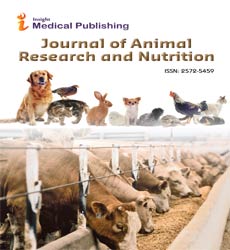Associated with Non-Animal Testing Strategies in Nutritional Research
Chang Nathanial*
Department of Animal Production, Wageningen University, Wageningen, Netherlands
DOI10.36648/2572-5459.9.1.112
Chang Nathanial*
Department of Animal Production, Wageningen University, Wageningen, Netherlands
- *Corresponding Author:
- Chang Nathanial
Department of Animal Production, Wageningen University, Wageningen,
Netherlands,
E-mail: Nathanial_c@gmail.com
Received date: January 08, 2024, Manuscript No. IPJARN-24-18907; Editor assigned date: January 11, 2024, PreQC No. IPJARN-24-18907 (PQ); Reviewed date: January 24, 2024, QC No. IPJARN-24-18907; Revised date: January 31, 2024, Manuscript No. IPJARN-24-18907 (R); Published date: February 08, 2024, DOI: 10.36648/2572-5459.9.1.112
Citation: Nathanial C (2024) Associated with Non-Animal Testing Strategies in Nutritional Research. J Anim Res Nutr Vol.9 No.1: 112.
Description
In nutrition research, a traditional trajectory has often entailed initiating scientific hypotheses grounded in in vitro data, progressing to in vivo verification using preferred animal models, and finally substantiating findings within a human context. From a regulatory standpoint, there isn't a specific mandate necessitating animal experimentation for evaluating the nutritional content and value of food products. Nonetheless, animal data often serve as the benchmark, and there exists a dearth of guidance regarding acceptable alternative approaches.
Landscape of methods in food
The landscape of methods and approaches applicable to food and nutrition research is evolving at an unprecedented pace. While animal methods have conventionally been associated primarily with food safety analysis, they also serve pivotal roles in proof-of-concept and mechanistic studies of products, as well as in assessing potency, efficacy and tolerance of foods and food ingredients. Recognizing the importance of advancing ethical research practices, members of the International Life Sciences Institute (ILSI) Europe have established an expert group. This group aims to explore the potential employment of alternative testing strategies in nutrition research and regulatory processes, aligning with the 3Rs principle of Replacement, Reduction, and Refinement of animal research. These strategies can ultimately support regulatory submissions for pre-market authorization.
The rapidly evolving methodologies and approaches pertinent to food and nutrition research, particularly those addressing food safety. These encompass the development of Thresholds of Toxicological Concern (TTC), read-across and grouping strategies, Adverse Outcome Pathways (AOPs), and corresponding in vitro assays aimed at delineating perturbations to key events in AOPs. In line with this, members of ILSI Europe have convened to deliberate on the viability, prospects, and obstacles associated with non-animal testing strategies in nutrition research. These endeavors seek to bolster regulatory submissions for pre-market authorization. Within this context, non-animal methods or approaches are framed within the purview of the 3Rs concept, advocating for animal-free methodologies whenever feasible, while also advocating for opportunities to reduce or refine animal use.
Animal testing strategies
Furthermore, it elucidates methodologies and approaches poised to facilitate this transformation, adhering to the principles of the 3Rs established over five decades ago. Section II expounds upon EU legislation concerning nutrition research and assessment, encompassing both animal and non-animal testing requisites. Section III delves into legislative aspects concerning specific food categories, while Section IV reviews regulations addressing health claims on foods. Section V delineates methodologies and approaches with the potential to catalyze a transition towards non-animal testing strategies in nutrition research and assessment, with a specific focus on organoid cultures, organ-on-a-chip systems, and gastrointestinal tract simulators. By doing so, the article furnishes a comprehensive framework for adopting non-animal testing strategies in nutrition assessment to meet contemporary and future testing imperatives.
The predominance of experimental animals utilized in scientific research predominantly comprises rodents (in excess of 95%), with an anticipated decline as alternative non-animal testing methods or methodologies emphasizing reduction and refinement, aligned with the 3Rs concept, gain traction. This directive mandates the replacement, reduction, and refinement of experimental animal usage. Grounded in article 13 of the Treaty on the Functioning of the European Union (TFEU), both the union and individual member states are obliged to prioritize the welfare and protection of animals. Compliance with the principle constitutes a legal imperative in the European Union (EU) for both research activities and regulatory testing employing live animals since the enactment of Directive 2010/63/EU in 2013. This directive serves as a horizontal legislative framework, applicable to testing conducted under sector-specific legislation, such as regulations pertaining to food safety aspects including food additives or supplements, novel foods, Genetically Modified Organisms (GMO) foods, or foods susceptible to nutritional and/or health claims. As articulated in article 13 of the directive, the adoption of replacement approaches to existing animal methods is mandated when another method or testing strategy for obtaining the result sought, not entailing the use of a live animal, is recognized under the legislation of the union. Concerning reduction or refinement of animal procedures, the directive necessitates the selection of methods that utilize the minimum number of animals; involve animals with the lowest capacity to experience pain, suffering, distress, or lasting harm; and cause the least pain, suffering, distress, or lasting harm while most likely to yield satisfactory results.

Open Access Journals
- Aquaculture & Veterinary Science
- Chemistry & Chemical Sciences
- Clinical Sciences
- Engineering
- General Science
- Genetics & Molecular Biology
- Health Care & Nursing
- Immunology & Microbiology
- Materials Science
- Mathematics & Physics
- Medical Sciences
- Neurology & Psychiatry
- Oncology & Cancer Science
- Pharmaceutical Sciences
